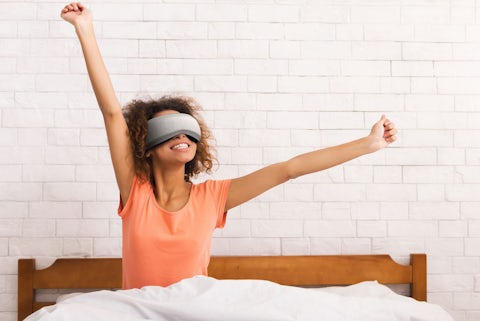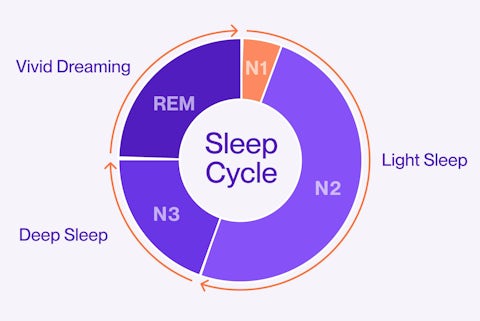What is Sleep Deprivation? – Symptoms, Causes, Effects & Treatment
 Andrew Jolie April 22, 2024 11 min read
Andrew Jolie April 22, 2024 11 min read
We often push sleep aside to do more in today's fast-paced world. But missing out on sleep comes at a cost. It's about more than feeling tired. Sleep deprivation affects everything from our health to how we get along with others. Let’s look at how lack of sleep hits us, why it happens, what it does to us, and how we can fix it. Let's explore the world of sleep deprivation. And let’s find ways to get the rest we need.
What is Sleep Deprivation?
Sleep deprivation happens when we don't get enough restful sleep. It can lead to health and mental issues. Occasional sleep loss differs from sporadic sleep deprivation. Not sleeping enough is known as chronic sleep deprivation. The latter is more serious and can have deeper impacts on your well-being.
Insomnia vs. Sleep Deprivation
Understanding the difference is important. It's crucial for fixing sleep issues. It's the difference between insomnia and not getting enough sleep. Insomnia is a medical condition that causes trouble falling asleep, staying asleep, or getting restful sleep. This condition can have many causes, including stress, anxiety, hormonal imbalances, and other health issues. Insomnia affects sleep at night and hurts function during the day. This leads to fatigue, mood issues, and worse performance in daily activities.
On the other hand, sleep deprivation results from insufficient sleep time. This can happen due to many lifestyle choices or demands. These include night shifts, work pressures, school work, parties, or binge-watching a favorite show. Insomnia involves trouble sleeping despite the chance to do so. Sleep deprivation comes from choosing or being forced to sleep less. Sleep deprivation has the same effects as insomnia. These include tiredness, dark circles, reduced attention span, and emotional volatility. Still, its causes are different, rooted in the quantity rather than sleep quality.
Recognizing insomnia or sleep deprivation helps you take the right measures. For those with insomnia, medical consultation and therapy or medication might be necessary. In contrast, fighting sleep deprivation might need lifestyle changes, which should prioritize sleep and manage time well. Both show the importance of good sleep hygiene. This includes keeping a regular sleep schedule. It means making a restful environment and limiting electronics before bedtime.
Causes of Sleep Deprivation
People in modern society are simply sleep-deprived. This is due to their choices, work, health, and environment, all of which disrupt sleep. Lifestyle choices are at the forefront. They revolve around the demands and allure of the digital age. The blue light from screens on smartphones, tablets, and computers can hinder melatonin, which regulates sleep-wake cycles. It makes it harder to fall asleep and stay asleep.
Work commitments are also critical. Long hours and shift work disrupt the body's clock and cut into sleep. For some, the line between work and home has blurred. This is especially true with the rise of remote work. It has led to difficulty "switching off" and winding down before bedtime. Also, if you have to travel quite a bit for work, you might being sleeping in beds you’re not used to, which may cause you not to sleep very well.
Insomnia and sleep apnea cause sleep disorders. Restless leg syndrome, sleepwalking, night terrors and illness can also rob people of restful sleep and they need medical help for relief. These disorders reduce sleep quantity and quality and exhaust you, even after spending enough time in bed.
Noise, poor sleep conditions, and room temperature can prevent deep, restorative sleep, which is crucial for physical and mental recovery. An environment can be too loud, bright, or hot/cold to get good shuteye.
The pressures of daily life can stress our minds, making relaxing and falling asleep difficult. Worrying about work, relationships, money, or world events (of which we have been having our fair share) can lead to a cycle of sleepless nights. It can also cause daytime fatigue, harming health and well-being.
Alcohol and caffeine can disrupt sleeping. In the case of alcohol, it may get you to sleep, but you’ll wake up possibly several times a night. And drinking caffeine before bedtime or too much during the day can make it hard to get adequate sleep for most people.
Symptoms of Sleep Deprivation
The telltale signs of sleep deprivation are hard to miss.
- Overwhelming fatigue: Feeling excessively tired throughout the day.
- Unpredictable mood swings: Experiencing rapid changes in mood without a clear cause.
- Trouble focusing: Difficulty concentrating on tasks at work or learning new information.
- Clumsiness: Increased incidents of clumsiness or lack of coordination.
- Microsleeps: When you have a hard time keeping your eyes open.
- Impact on daily tasks: Work, learning, or communication challenges.
- Physical health deteriorates: It is gradual wear on your body. It can lead to health issues.
- Mental well-being affected: Influence on emotional states, harming relationships and self-esteem.
- Low sex drive: Yes, lack of sleep will not get you in the mood.
- Driving hazard: You become a danger on the road, because of microsleeps.
- Empty social battery: You’ll probably not want to be as social as usual.
Side Effects of Sleep Deprivation
Sleep deprivation's effects ripple far beyond feeling tired. Over time, missing sleep can lead to health issues.
- Risk of chronic conditions: Long-term lack of sleep increases the risk of heart disease, diabetes, inflammation and obesity. Decrease in immune system’s ability to fight off diseases and infections.
- Mental health impact: Sleep deprivation can cause significant psychological strain like anxiety and depression.
- Cognitive functions affected: Memory, decision-making, and problem-solving skills can all suffer.
How to Recover from Sleep Deprivation
You need to act quickly to recover from sleep deprivation. Long-term changes are also needed to heal the sleep cycle and boost vitality. Adding short naps to your day can be a quick fix in the short run. They give a needed energy boost and boost concentration. However, keeping these naps short is essential to avoid affecting nighttime sleep quality.
Improving your sleep hygiene plays a pivotal role in this recovery process. This includes setting a regular sleep schedule to match your body's rhythms, creating a calm sleep environment that's dark, quiet, and cool, and cutting evening screen time to avoid their sleep-disrupting blue light. These steps lay the groundwork for a healthier sleep pattern.
But for real, lasting recovery, facing and fixing the root causes of sleep loss is vital. This might involve managing stress with techniques like meditation or yoga. It could also mean changing habits that hurt sleep, such as drinking caffeine late in the day. Seek professional help for sleep disorders like insomnia or sleep apnea.
Recovering from sleep deprivation requires lifestyle changes. They promote restful sleep, which is crucial for health. It's not just about adding more sleep hours. This approach guarantees better sleep and a balanced life.
Preventing Sleep Deprivation
Preventing sleep deprivation is crucial for maintaining both physical health and mental well-being. It involves adopting several practical strategies to promote better sleeping patterns and habits. A cornerstone of these efforts is establishing a consistent sleep schedule. Going to bed and waking up at the same time every day, even on weekends, helps regulate your body's internal clock. It makes it easier to fall asleep and wake up naturally.
Equally important is creating an environment conducive to quality sleep. This means keeping your bedroom cool and comfortable. Make sure it's dark with blackout curtains or an eye mask (or even a smart sleeping mask). Also, cut noise with earplugs or a white noise machine. Such an environment signals your body that it's time to sleep, aiding the transition into rest.
Lifestyle adjustments are another vital component of preventing sleep deprivation. This includes dietary changes. For example, cut caffeine intake. This is especially important later in the day. It's to avoid disrupting your sleep. Avoid screens before bed. They emit disruptive blue light. It comes from phones, tablets, and computers. It can mess up your sleep.
Exercising reguarly can also enhance sleep quality. However, it's best to avoid hard exercise close to bedtime. It can energize you instead of preparing you for rest. Instead, calm activities, like reading or a warm bath, can help prepare your mind and body for sleep.
Together, these steps can reduce the risk of sleep deprivation and improve your life. By making sleep a priority and using these strategies, you're taking a key step towards a healthier, more balanced life.
FAQs about Sleep Deprivation
What are the stages of sleep deprivation?
1. Initial Stage (0-24 hours without sleep):
- You may feel increased irritability and moodiness.
- There's a noticeable decline in alertness and a slight impairment in cognitive functions, such as attention span and memory.
- Many people experience a reduced ability to handle stress and minor frustrations.
2. Short-term Stage (24-48 hours without sleep):
- Cognitive impairments become more pronounced. You might struggle with concentration, problem-solving, and decision-making.
- Physical symptoms start to emerge, including feelings of fatigue, decreased coordination, and delayed reaction times.
- Due to decreased motor skills and alertness, there's an increased risk of accidents and mistakes at work or while driving.
3. Acute Stage (48-72 hours without sleep):
- Emotional responses are heightened; you might experience anxiety, depression, or paranoia.
- Hallucinations and disordered thoughts can occur, indicating significant neurological stress and disruption.
- The immune system starts to function poorly, increasing susceptibility to infections and illnesses.
4. Chronic Stage (Over 72 hours without sleep):
- Severe cognitive deficits are present, with the potential for delusional thinking or psychosis under extreme conditions.
- Major health risks emerge, including high blood pressure, heart disease, diabetes, and obesity, due to hormonal imbalances and metabolic changes.
- The risk of severe mental health issues increases, alongside a noticeable decline in quality of life due to ongoing emotional and physical distress.
5. Severe Stage (Extended periods without adequate sleep):
- This stage involves profound, chronic impacts on health and well-being.
- Long-term sleep deprivation can lead to irreversible health problems, including neurodegenerative diseases like Alzheimer's.
- The body's systems are under intense strain, potentially leading to life-threatening conditions.
How many hours of sleep is considered sleep deprivation?
The threshold for sleep deprivation varies by age and individual needs. Generally, adults require 7-9 hours of sleep, teenagers require about 8-10 hours, and younger children need even more. Sleeping less than your age group's recommended hours consistently can lead to sleep deprivation, affecting everyone differently.
How long does it take to fix sleep deprivation?
Recovering from sleep deprivation depends on its severity and the adjustments you make. For minor cases, a few nights of better sleep might suffice. However, chronic sleep deprivation could take weeks of adhering to a healthier sleep schedule and making lifestyle changes to fully recover and restore the body's natural sleep rhythm.
Can lack of sleep make you sick?
Yes! Lack of sleep can contribute to a decline in your overall health, particularly by weakening your immune system and making you more susceptible to various infections and diseases. The relationship between sleep and the immune system is complex and involves several key mechanisms:
1. Reduction of Cytokine Production:
Cytokines are proteins that play a critical role in the immune system by targeting infection and inflammation. They are produced and released during sleep. When you don't get enough sleep, your body produces fewer cytokines, impairing your body's ability to fight off infections and increase the duration of illnesses.
2. Decrease in Antibody Production:
Sleep deprivation can also affect the production of antibodies, which are crucial for fighting off pathogens. Without adequate sleep, the body's antibody response is weakened, making it more difficult to combat common infections such as the flu or a cold.
3. Impact on T-cell Function:
T-cells are white blood cells that are vital to the immune response. Research indicates that lack of sleep can reduce T-cells' efficiency by increasing stress hormone levels in the body. These hormones can decrease the ability of T-cells to adhere to and destroy cells infected with viruses.
4. Long-term Effects on Health:
Chronic sleep deprivation has been linked to a higher risk of serious health conditions, including heart disease, diabetes, obesity, and certain cancers. This is partly due to the ongoing strain on the immune system, which can protect the body less from these conditions.
5. Mental Health Impact:
Beyond physical health, inadequate sleep can negatively affect mental health, increasing the risk of disorders such as depression and anxiety. These conditions can, in turn, further disrupt sleep patterns, creating a vicious cycle that can be difficult to break.
6. Recovery and Healing:
During sleep, the body undergoes various processes of repair and regeneration. Lack of sleep can slow down these processes, affecting the body's ability to heal and recover from injuries, infections, and other ailments.
What happens if you're sleep-deprived for a long time?
Long-term sleep deprivation can lead to chronic health issues such as cardiovascular disease, diabetes, and obesity. It can also exacerbate mental health problems like anxiety and depression. The prolonged impact on physical and mental health can significantly diminish the quality of life, highlighting the importance of promptly addressing sleep issues.


